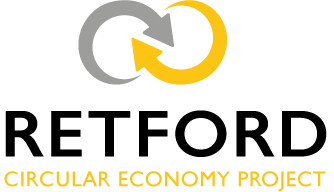THE PROJECT
Pulverised Fuel Ash (PFA) is a by-product resulting from the burning of coal in power stations. Due to the mineral qualities of the ash, it can be incorporated sustainably into a range of building products. The PFA is located within a former landfill, with a thin covering of soils and sand, that has been restored to low quality agricultural land.
The aim of RCEP is to produce a sustainable cement replacement material, made from PFA. The material can save close to 1 tonne of carbon for every tonne that replaces traditional cement, known as ‘Portland Cement’; therefore saving a colossal amount of carbon and helping the UK to meet its climate change targets.
RCEP would carefully extract around 300,000 tonnes of PFA waste a year, providing a vital tool to decarbonise our building products industry at a time when ‘fresh’ supply of PFA from existing power stations is ending due to closures. The alternatives to extracting from PFA deposits in the UK include importing material from abroad, often from as far away as Turkey and India, or using more carbon intensive materials.
The graphic below demonstrates the significantly more complex and carbon intensive process required to manufacture traditional Portland Cement compared to PFA from the RCEP.
When used as a replacement for traditional cement, PFA can save close to 1 tonne of carbon dioxide (CO2) for every tonne used. This is because cement production is energy and carbon intensive, requiring the raw ingredients to be kilned at around 1,500 degrees centigrade, whereas PFA has already been through a thermal process in the power station where it was produced.

The need to reduce carbon emissions and reduce the use of natural resources mean that there is significant demand for PFA. However, the supply is currently in a state of change, as the UK now only has three coal–fired power stations in operation, with all of them set to close by 2025. The availability of domestically produced fresh PFA has therefore all but ended, meaning carbon intensive cement is being used instead.
Worldwide, around 30 billion tonnes of concrete are used each year. On a per capita basis, that is 3 times as much as 40 years ago — and the demand for concrete is growing more steeply than that for steel or wood. Concrete is the most consumed substance on the planet, after only water.
RCEP offers a solution, by securing a continued source of PFA for the UK supply chain to be used as a sustainable building product. This would help the UK Government to achieve its climate targets, whilst protecting parts of the economy reliant on sustainable building products.
It is estimated that RCEP could save more than 5 million tonnes of carbon over its lifetime when all construction and operational emissions from the project are considered. With the potential for further improvements in the future.
PFA has historically replaced traditional Portland Cement at up to around 40% in concrete mixes; however, there are new products entering the market that are pushing the amount of PFA and other by-products that can be used significantly higher and others that remove the need for Portland cement altogether.
The PFA at the RCEP Site requires a simple process of extraction, screening and drying. To save further carbon it is proposed to use a low energy drying technology, that applies air rather than heat to dry the material.
Estimated 5 million tonnes of carbon saved
MICRO-PHASES
We will extract the PFA in what we call ‘Micro-Phases’ of around 0.5-1.0 hectare each, meaning that we will only ever extract from less that 1% of the RCEP Site at any give time. This will limit operations to a very small area. We will then restore each Micro-Phase as soon as the PFA is extracted from it, meaning that exposed areas will be very limited. The majority of the land will either be restored, undergoing restoration, or remain untouched an subject to grazing at any given time during the project.
The Micro-Phasing approach is one of a number of significant improvements we have made to the project, which are set out in the Updated Proposals here.

